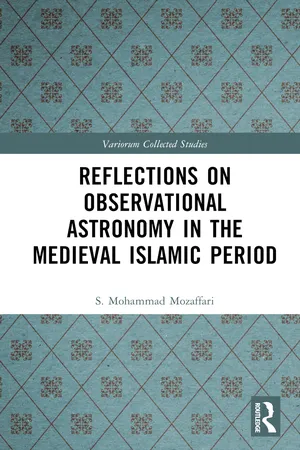
Reflections on Observational Astronomy in the Medieval Islamic Period
- 352 pages
- English
- ePUB (mobile friendly)
- Available on iOS & Android
Reflections on Observational Astronomy in the Medieval Islamic Period
About this book
This volume presents comprehensive investigations into various facets of observational astronomy during the medieval Islamic period, spanning from the ninth to the seventeenth centuries. The chapters compiled here, originally published between 2012 and 2018, have undergone significant revisions to enhance their accuracy and explore a broad spectrum of topics organized into five main sections.
Reflections on Observational Astronomy in the Medieval Islamic Period begins with solar astronomy, providing a detailed evaluation of Islamic astronomers' determinations of fundamental solar parameters. In the realm of lunar astronomy, it examines the gradual endorsement and rationalization of annular solar eclipses, along with an exclusive historical account of predicting and observing such an event in 1283 CE. The section on planetary astronomy scrutinizes empirical discoveries that distinguish between the precession of equinoxes and the motion of apogees, as well as significant enhancements to Ptolemy's parameters for planetary latitudes. Stellar astronomy is explored through a non-Ptolemaic star table that encompasses observations from ninth-century Baghdad to thirteenth-century Mar?gha. The final section examines observational instruments, focusing on those constructed during the second period of activities at the Mar?gha observatory. A critical analysis of astronomical observations conducted at the Mar?gha and Istanbul observatories is a key focus of this work.
This book will be invaluable to those interested in the historical progression of exact sciences; the scope, distinctive aspects, and caliber of experimental activities in medieval times; and the interplay between theory and observation throughout history. It is intended for historians, scientists (including astronomers and physicists), and particularly, historians of astronomy.
Frequently asked questions
- Essential is ideal for learners and professionals who enjoy exploring a wide range of subjects. Access the Essential Library with 800,000+ trusted titles and best-sellers across business, personal growth, and the humanities. Includes unlimited reading time and Standard Read Aloud voice.
- Complete: Perfect for advanced learners and researchers needing full, unrestricted access. Unlock 1.4M+ books across hundreds of subjects, including academic and specialized titles. The Complete Plan also includes advanced features like Premium Read Aloud and Research Assistant.
Please note we cannot support devices running on iOS 13 and Android 7 or earlier. Learn more about using the app.
Information
Table of contents
- Cover
- Half Title
- Series
- Title
- Copyright
- Contents
- Acknowledgments
- Introduction
- Part I Solar Astronomy
- Part II Lunar Astronomy and Theory of Eclipses
- Part III Planetary Astronomy
- Part IV Stellar Astronomy
- Part V Observational Instrumentation
- Index